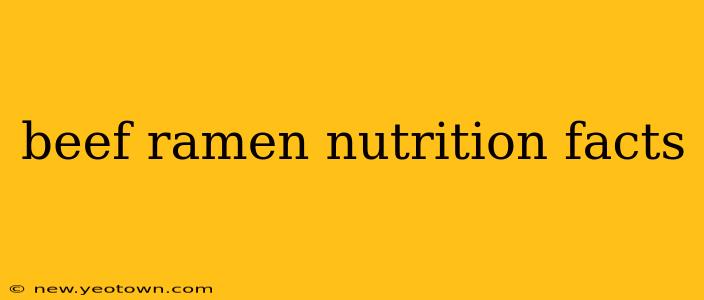Ramen. The word itself conjures images of late-night study sessions, comforting warmth on a chilly evening, and a quick, satisfying meal. But have you ever stopped to consider the nutritional content of that steaming bowl of beef ramen? It's more complex than you might think, varying wildly depending on the brand and ingredients. This deep dive explores the nutritional facts of beef ramen, addressing common questions and helping you make informed choices.
We'll explore everything from the calorie count and macronutrient breakdown to the vitamin and mineral content, and even delve into healthier alternatives and how to boost the nutritional value of your favorite ramen. Get ready to unpack the bowl and uncover the truth about beef ramen nutrition!
What are the Calories in Beef Ramen?
This is probably the first question that pops into most people's heads. The calorie count in a typical package of beef ramen noodles can range significantly, typically from 300 to 450 calories. However, this number can easily climb depending on the additions. Think of extra meat, a generous helping of oil, or a rich, flavorful broth – all contributing significantly to the overall caloric intake. A single serving often fails to represent what many people consider a "full meal" of ramen, leading to higher overall calorie consumption. Always check the nutrition label on the specific brand and variety you're consuming for the most accurate information.
How Much Protein is in a Bowl of Beef Ramen?
Beef ramen offers a decent amount of protein, generally between 10 to 15 grams per serving. However, this protein is often overshadowed by the high sodium and carbohydrate content. The protein source is primarily from the beef flavoring and any added meat, but keep in mind that this is often processed meat which may be less beneficial compared to leaner protein choices.
What is the Sodium Content in Beef Ramen?
This is where many beef ramen varieties fall short. The sodium content is notoriously high, frequently exceeding 1500mg per serving, which is a significant portion of the recommended daily sodium intake. This high sodium content is largely due to the seasoning packets included with most instant ramen products. Excess sodium intake has been linked to several health problems, including high blood pressure. This is a critical factor to consider for anyone watching their salt intake.
Is Beef Ramen Healthy?
The simple answer is: it depends. Instant beef ramen, in its basic form, is generally not considered a "healthy" meal due to its high sodium and processed ingredient content. However, it can become part of a balanced diet if consumed occasionally and modified to increase its nutritional value.
What are the Healthier Alternatives to Beef Ramen?
For healthier alternatives, consider homemade ramen broth made with fresh ingredients, using whole-wheat noodles or even shirataki noodles for a lower-carb option. Supplementing your ramen with plenty of fresh vegetables such as bok choy, mushrooms, and spinach adds crucial vitamins and fiber. Adding lean protein sources like grilled chicken or tofu significantly boosts the nutritional profile.
How Can I Make Beef Ramen Healthier?
Don't throw out your ramen addiction! You can easily boost the nutritional profile of your beef ramen. Start by rinsing the noodles thoroughly to reduce sodium. Use only half, or even less, of the seasoning packet. Supplement your bowl with plenty of vegetables and a lean protein source. Experiment with different healthy broths and use fresh ingredients for a more nutrient-dense meal.
Conclusion: Beef Ramen – A Balanced Perspective
Beef ramen is a convenient and comforting food, but it’s essential to understand its nutritional content and make informed choices. By being mindful of the high sodium content and supplementing with healthy additions, you can transform a potentially unhealthy meal into a more balanced and nourishing one. Remember, moderation and conscious choices are key to enjoying this culinary staple without compromising your health.

